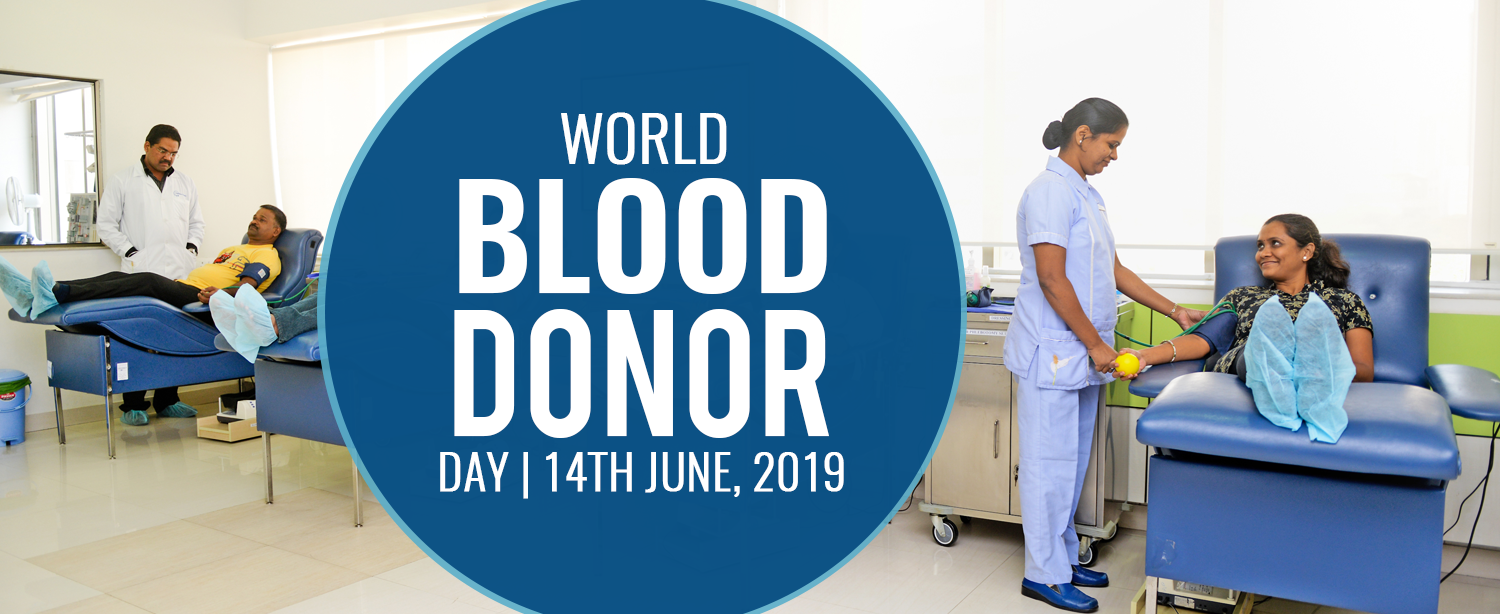The world observes World Blood Donor Day (WBDD) on 14th June every year. There are medical camps held worldwide to encourage blood donation and spread the message of blood donation. Blood is an important resource, both for planned treatments and urgent interventions. It is irreplaceable. It can help patients suffering from life-threatening conditions live longer and with a higher quality of life, and supports complex medical and surgical procedures. Blood is also vital for treating the wounded during emergencies of all kinds (natural disasters, accidents, armed conflicts, etc.) and has an essential, life-saving role in maternal care.
Blood Donation Facts
- It is good for your heart health – Donating blood regularly can help to reduce how thick and sticky your blood is, thus allowing blood to flow more easily through the blood vessels and reach the heart faster.
- Helps burn calories – You can burn about 650 calories per donation of one pint of blood.
- Type O Positive Blood is the most needed – Although all types of blood are needed and accepted, type O positive is the most needed. It’s the most common blood type and can be transferred to any other positive blood types.
Blood Donation myths
The myths surrounding blood donation discourage many voluntary donors from giving blood. Here are a few myths:
- Myth #1: Donating blood is not good for my health, I’ll become weak.Fact: Donating blood does not affect your body in any way. Only 350-450 ml of blood is taken during a donation session. The body has approximately 5 litres of blood, and easily replenishes the blood that is donated.
- Myth #2: I can contract HIV or other infections from donating blood.Fact: Sterility is maintained at every level of the blood donation process. A new, sterile needle is used for each donation and is properly discarded at the end of each session. infection.
- Myth #3: I have already donated once this year, I can’t donate again.Fact: You can donate four times a year, once every three months.
- Myth #4: I can’t participate in sports or other physical activity after donating blood.Fact: No, donating blood does not interfere with your ability to perform physically. However, you will be advised to stay away from heavy lifting and strenuous workouts for the rest of the day after the donation. You can get back on track the next day.
- Myth #5: Women can’t donate blood.Fact: While most women tend to have lower haemoglobin, anyone with haemoglobin levels of 12 and above can donate blood.
Things to know for Blood Donation
Often when donors turn up for emergency blood donations or even in voluntary blood donation drives, there are various eligibility criteria to look into. Follow these simple pre-donation steps to ensure that you will have a safe and successful blood donation:
1. Ascertain your eligibility:
Although blood banks will ensure that only an eligible donor shall donate blood, a donor can still ascertain his/her eligibility before walking in to donate. In general, the donor:
- Must be in the age group of 18 – 60 years
- Must not have had a minor surgery in the last 6 months and a major surgery in the last 12 months.
- Must not have had a case of ear piercing in the last 6 months.
- Must not have had a case of dental extraction in the last 3 months.
- Must not have suffered from jaundice, typhoid in the last 1 year and malaria in the last 3 months.
- Must not have donated whole blood in the last 3 months.
- Must be healthy, fit, and not suffering from a current illness.
- Women should not be pregnant or breast feeding her child
- Must be free from Diabetes, not suffering from chest pain, heart disease or unexplained fever.
- Also, donor’s blood pressure, haemoglobin and weight are checked before the donor is deemed fit for blood donation.
2. Sleep well on the previous night:
Getting a good night’s sleep the night before your donation is important because being tired can affect hormone levels.
3. Drink plenty of water:
Studies have shown that drinking a lot of water before a blood donation lessens the risk of fatigue and fainting. Water can increase the activity of the sympathetic nervous system that makes people more alert, increases blood pressure and give more energy.
4. Have something to eat in the last 3 hours:
Eat a healthy meal before your donation. Avoid fatty foods, before donating. Tests for infections done on all donated blood can be affected by fats that appear in your blood for several hours after eating fatty foods.
5. Avoid alcohol consumption in 12-24 hours prior to donation:
At a rule of thumb, the person must not have had alcoholic drinks of any kind in last 12 hours at least.
6. Avoid smoking in last 2 hours:
It is generally advisable to avoid smoking 2 hours before a donation.
7. Ensure your Hb and blood pressure is at required levels:
Before you get onto the cot for a blood donation make sure that your haemoglobin level is tested and is in the acceptable range of >=12.5 g/dL. Also make sure that the blood bank checks your blood pressure levels.
Currently, in India, over 12 million units of blood are required annually, but only nine million units are available. As in many countries, including India, the demand exceeds supply, blood banks face the challenge of making blood available while taking care of the safety and hygiene. An adequate supply can only be assured through regular donations by voluntary unpaid blood donors. Consult our Department of Transfusion Medicine for more details. Call our Blood Bank on 022-30937293, or visit the find below link for more details:


